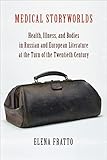Medical Storyworlds : Health, Illness, and Bodies in Russian and European Literature at the Turn of the Twentieth Century / Elena Fratto.
Material type: TextPublisher: New York, NY : Columbia University Press, [2021]Copyright date: 2021Description: 1 online resourceContent type:
TextPublisher: New York, NY : Columbia University Press, [2021]Copyright date: 2021Description: 1 online resourceContent type: - 9780231202329
- 9780231554503
- Death in literature
- French literature -- 20th century -- Themes, motives
- Health in literature
- Italian literature -- 20th century -- Themes, motives
- Literature and medicine
- Medicine in literature
- Russian literature -- 19th century -- Themes, motives
- Russian literature -- 20th century -- Themes, motives
- LITERARY CRITICISM / Russian & Former Soviet Union
- 809/.933561 23
- PN56.M38 F73 2021
- online - DeGruyter
| Item type | Current library | Call number | URL | Status | Notes | Barcode | |
|---|---|---|---|---|---|---|---|
 eBook
eBook
|
Biblioteca "Angelicum" Pont. Univ. S.Tommaso d'Aquino Nuvola online | online - DeGruyter (Browse shelf(Opens below)) | Online access | Not for loan (Accesso limitato) | Accesso per gli utenti autorizzati / Access for authorized users | (dgr)9780231554503 |
Frontmatter -- CONTENTS -- ACKNOWLEDGMENTS -- INTRODUCTION -- Chapter One. THE GRAND FINALE: Death as the Revelatory Ending -- Chapter Two. END OF STORY: Temporality and the Prospect of the Ending in Ivan Ilych, Anna Karenina, and (Potential) Cancer Patients -- Chapter Three. MEDICAL ENLIGHTENMENT IN THE EARLY 1920S: Rhetoric and Diffused Authorship in Jules Romains’s Knock and Soviet Public- Health Campaigns -- Chapter Four. TIME, AGENCY, AND BODILY GLANDS: Metabolic Storytelling in Italo Svevo and Mikhail Bulgakov -- AFTERWORD -- NOTES -- BIBLIOGRAPHY -- INDEX
restricted access online access with authorization star
http://purl.org/coar/access_right/c_16ec
Though often seen as scientific or objective, medicine has a fundamentally narrative aspect. Much like how an author constructs meaning around fictional events, a doctor or patient narrates the course of an illness and treatment. In what ways have literary and medical storytelling intersected with and shaped each other?In Medical Storyworlds, Elena Fratto examines the relationship between literature and medicine at the turn of the twentieth century—a period when novelists were experimenting with narrative form and the modern medical establishment was taking shape. She traces how Russian writers such as Dostoevsky, Tolstoy, and Bulgakov responded to contemporary medical and public health prescriptions, placing them in dialogue with French and Italian authors including Romains and Svevo and such texts as treatises by Paul Broca and Cesare Lombroso. In nuanced readings of these works, Fratto reveals how authors and characters question the rhetoric and authority of medicine and public health in telling stories of mortality, illness, and well-being. In so doing, she argues, they provide alternative ways of thinking about the limits and possibilities of human agency and free will. Bridging the medical humanities, European literary studies, and Slavic studies, Medical Storyworlds shows how narrative theory and canonical literary texts offer a new lens on today’s debates in medical ethics and bioethics.
Mode of access: Internet via World Wide Web.
In English.
Description based on online resource; title from PDF title page (publisher's Web site, viewed 20. Nov 2024)


